#but context is not nor has it ever been trolls' strong suit
Note
So....have you read the latest Avengers #20, about the current version of She Hulk? How do you feel about that?
I’ve made a point of avoiding Jason Aaron’s Avengers because I truly can’t stand what he’s done to Jen. He took a character who, for all her more recent traumas, for all she can struggle to balance her legal career with her the pitfalls of being a publicly known superhero, loves who she is and embraces being green wholeheartedly -- he took Shulkie and turned her into Lady Bruce Banner, retiring lawyer whose inner ragemonster is just waiting to break loose. It’s some deep-seated bullshit and I’ve been trying my best to simply wait for it all to pass over.
But it was hard to ignore Avengers #20, because this was the issue where Jason Aaron went right off the fucking rails. I mean, he really went full Aaron Sorkin on his readers, and that isn’t a compliment.
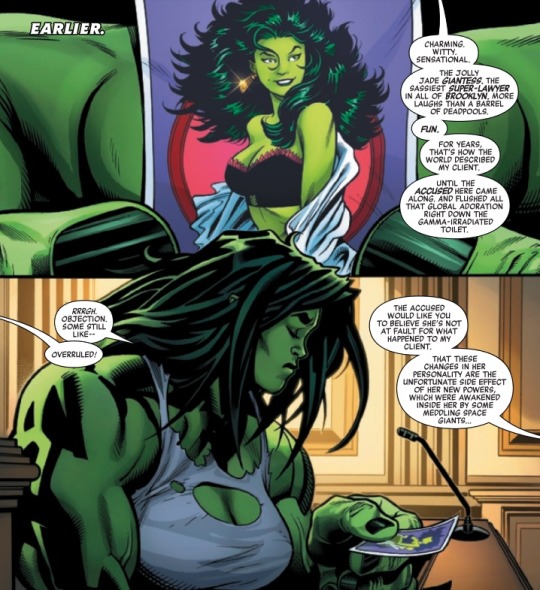
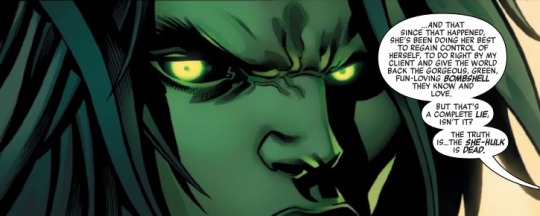
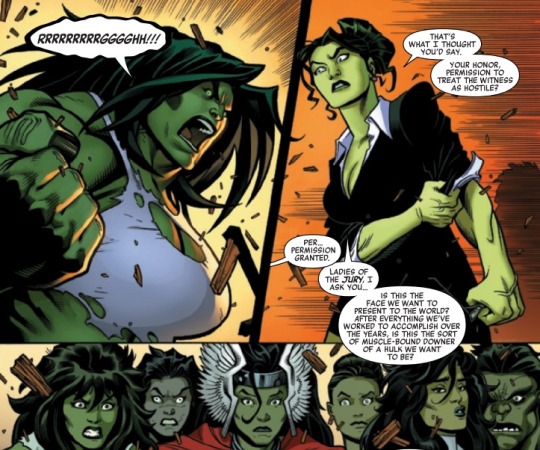
Classic She-Hulk: Charming. Witty. Sensational. The Jolly Jade Giantess. The sassiest super-lawyer in all of Brooklyn. More laughs than a barrel of Deadpools. Fun. For years, that’s how the world described my client. Until the accused came here and flushed all that global adoration down the gamma-irradiated toilet.Jason Aaron She-Hulk: Rrrgh. Objection. Some still like--Judge Jen: Overruled!Classic She-Hulk: The accused would like you to believe she’s not at fault for what happened to my client. That these changes in her personality are the unfortunate side-effect of her new powers, which were awakened inside her by some meddling space giants... and that since that happened she's been doing her best to regain control of herself. To do right by my client and give the world back the gorgeous, green, fun-loving bombshell they know and love. But that’s a complete lie, isn’t it? ... Ladies of the jury, I ask you... is this the face we want to present to the world? After everything we’ve worked to accomplish over the years, is this the sort of muscle-bound downer of a Hulk we want to be?
This sequence takes place in the context of a mental simulation being used by Jen in an effort to build her control over her powers, but in truth it’s just three long and excruciating pages of Aaron taking petty swipes at fans who are unhappy with his portrayal of She-Hulk. Through this exchange, he deliberately frames criticisms of his She-Hulk as shallow, over-the-top and sexist, suggesting that those of us who dislike his barely-recognisable ‘roidmonster Jen simply don’t understand good writing and that we just want a fun sexy green bombshell to wank over.
(Also implicit in this, and indeed throughout the comic, is the view that classic She-Hulk is less meaningful as a character because her comics are frequently humour-oriented. ‘Funny’ is situated in contrast to ‘deep’, ignoring the fact that Jen’s best writers have found room for both, and that Aaron’s She-Hulk fails to be either.)
And that sets the tone for the whole issue. From that point on, the entire comic is just Aaron transparently editorialising that no, you guys just don’t get it, my She-Hulk is better and deeper and more feminist than your She-Hulk.
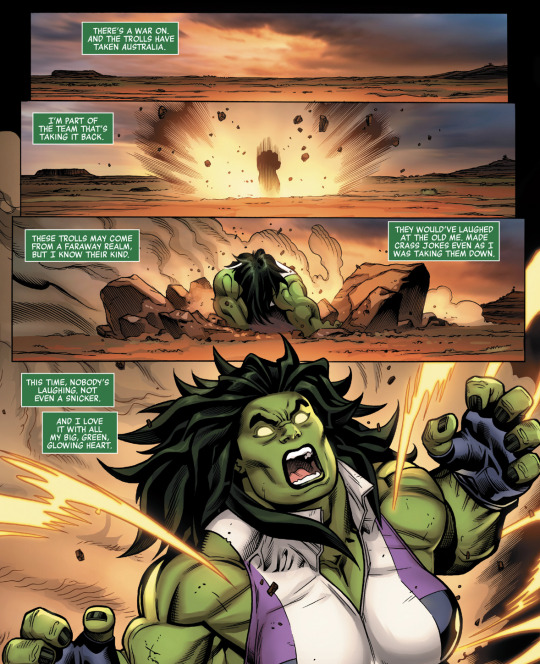
“I was an omega-level threat in the charm department. I was the Hulk you’d want to have a glass of pinot with. And the craziest part was, my powers, for the most part... made me happy. An incredibly rare occurrence in my line of work. I actually enjoyed being a hero. I loved being the fun Hulk. I loved it a whole helluva lot. So how come I don’t miss it?
“There’s a war on. And the trolls have taken Australia. I’m part of the team that’s taking it back. These trolls come from a faraway realm, but I know their kind. They would’ve laughed at the old me. Made crass jokes even as I was taking them down. This time, nobody’s laughing. And I love it with my all big, green, glowing heart.”
The frustrating thing is, he’s right on the cusp of something genuinely interesting here.
Men who speak angrily and aggressively are apt to be seen as tough, forceful and strong-willed; women who do the same are more often viewed as shrill, nagging, hysterical, bitchy. Many women consciously or unconsciously learn to mask their anger, make ourselves smaller and less threatening. Asserting yourself can be the difference between being seen as the ‘fun girl’ and the humourless bitch.
And the sexual harassment he references -- the sexist jokes, the propositioning, the devaluing of women’s capabilities -- not only are these things that many women, from the most disadvantaged to the most powerful, face to different degrees, they’re relevant on a meta level to the portrayal of women in comics.
All of these themes would be ripe for exploration in the context of classic She-Hulk. Jen is a fun-loving character whose life isn’t governed by rage and the need to control it the way other Hulks are, but that doesn’t mean she can always afford to lose her temper -- as both a woman working in a profession rife with sexism and ‘old boys club’ attitudes, and as a female superhero in the public eye, “you wouldn’t like me when I’m angry” takes on a whole different meaning.
Conversely, we might also think about Jen’s privilege in this regard -- that by virtue of her public profile and influence and general ability to grind men into a pulp without breaking a sweat, she doesn’t face the same level of discrimination as other women. That other women (particularly women of colour and LGBTQI women) don’t have the same freedom to express their anger as she does, not without consequences. And that -- as both the superhero She-Hulk and as the high-profile lawyer Jennifer Walters -- she is in a position to help other women to be heard and ensure that their anger is answered with change.
As for historical sexism in comics, there’s no better antidote to the male gaze than hiring more women and nonbinary people.
None of that seems to interest Jason Aaron. Rather, in defence of his roided-out Girl Bruce, he seems to be saying... what? ‘I have fixed sexism by making Jen so buff that men are too scared to undervalue or sexually harass her’?
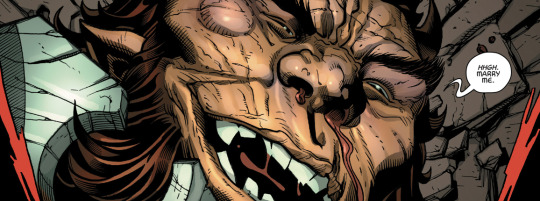
(Which, by the way, they still do anyway.)
Next, we get this exchange:
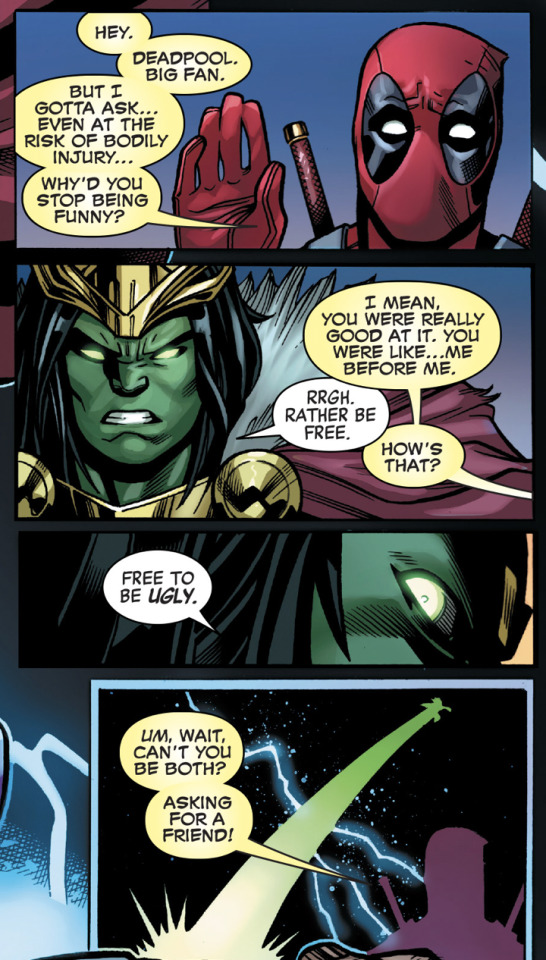
Deadpool: Why’d you stop being funny? I mean, you were really good at it. You were like... me before me.She-Hulk: Rrgh. Rather be free.Deadpool: How’s that?She-Hulk: Free to be ugly.Deadpool: Um, wait, can’t you be both?
So, the implication is that before now, Jen wasn’t “free” to be her whole self -- that she had to be the fun, funny girl to avoid being seen as too angry and threatening.
And aside from the fact that, as I said, I think there are many more nuanced ways to explore this without negating Jen’s characterisation -- this is just lazy goddamn writing. It’s not an idea Aaron has explored up till now, nor is it reflective of the ways in which Jen has been portrayed in the past. It’s just a messy retcon jammed into the story to justify the ‘superiority’ of Aaron’s version of the character. Once again, the writer is speaking through the characters.
We also see Aaron once again implying that being “ugly” -- by which he means physically imposing, buff, not resembling a typical comic book pinup girl -- ‘frees’ Jen from the constraints of sexism, which is full-blown outrageous.
You think that men only sexually harass women they deem attractive? Really? You think that sexism stops at catcalls and underestimation? You think that Jen, a female superhero in the public eye, isn’t going to be subjected to ugly sexist slurs no matter what she looks like? That is as insulting as it is naive.
Later, Aarons-via-Jen engages in some meta-criticism of the fact that She-Hulk has traditionally been portrayed not as a huge, buff ragemonster but as a sexy bodybuilder (and retconning in a shit-ton of sexual harassment while he’s at it, because remember, sexism only affects women society deems conventionally attractive).

“Cousin Bruce said something once, a few years back... about how envious he was of me. How easy he figured I had it. When he hulked out, he became a giant, deformed monster who couldn’t even wear normal clothes. While there I was looking like a bodybuilder who’d just been spray-painted green. I could wear suits, walk down the street without people running and screaming. Teenage boys hung posters of me on their walls. Must be nice, Bruce said to me, to be that kind Hulk.
“I’d never wanted to punch my cousin so bad. And that’s saying something. I told him about the parts of being me that he was oblivious to. About all the times I’d been hit on during team-ups. The bad guys who’d cop a feel when we were fighting. The sleaze ball who published photos of me topless when I was in the Fantastic freaking Four. (I’d really rather you didn’t Google that.) No paparazzi ever followed Bruce around taking photos of his butt while he was fighting the Leader. I told him... looking like a big scary monster didn’t seem so bad to be sometimes.”
And here we really get to the thesis underlying Aaron’s argument, the reason he feels She-Hulk needed a complete overhaul.
Like most superheroines, She-Hulk was shaped by the male gaze. It’s fair to say that played a lot into her original character design as a green Amazonian bombshell, whose appearance and comparative level-headedness stood in stark contrast to the huge, monstrous, rage-driven Hulk whose powers she inherited. Heroines in cape comics are supposed to be ‘fun’ and ‘sexy’ (as judged by the men they were typically being written by and for). Jen’s body has frequently been the subject of titillation and her promiscuity has frequently been the subject of crude humour.
Aaron seems to view this as the flaw at the heart of the character, and it’s something he’s set out to correct -- by making her the gigantic, buff, scary, angry Hulk she was never allowed to be at the outset. Sexism thwarted! Strong Female Character accomplished! Give yourself a pat on the back, Jason.
Except, here’s the thing.
It’s true that Jen has often been depicted through the lens of a male sex fantasy.
It’s also true that many readers have embraced her as a female power fantasy.
As the super-buff, super-strong, seven-foot-tall She-Hulk, Jen doesn’t feel the need to bite her tongue or moderate her opinions or diminish herself out of concern for how others might respond. She doesn’t have to hide her confidence or her sexuality. Through her transformation, Jen gains the freedom to embrace all that she’s been repressing -- the brilliant, witty, brash, assertive, body-confident parts of herself she’s always kept hidden from the world.
In looking at Jen selectively through the lens of sexualised artwork, instances of bad writing and a frankly snobbish undervaluing of humour comics, Aaron zooms right past everything that makes her such an appealing and empowering character to so many readers.
Which brings me right back to Deadpool’s comment earlier in the issue: Can’t you be both?
If your complaint is that Jen is portrayed in a male-gazey, overly sexualised manner that de-emphasises her strength and physical power, hire an artist who will draw her as the buff, badass giantess that she is.
She-Hulk doesn’t need a gamma power-up or a brutish alter ego to be formidable, she’s She-Hulk ffs. And stripping Jen of all her femininity in the process of turning her into a ‘roided-out tank raises some dodgy gendered assumptions in itself.
(For me, Peak Jen is a giant buff green woman in a bright pink designer suit. Not only can she be both, she already was.)
And hey, just gonna throw this one out there again, if your complaint is that since her creation Jen has been predominantly written and drawn from male perspectives for a male audience, resulting in some sexist and oversexualised portrayals, how about you hire some goddamn women and nonbinary people to write and draw her?
This is not the Great Feminist Reimagining of She-Hulk that you think it is, Jason Aaron. This is a slightly more pretentious rehash of that time David Goyer dismissed the character as a “giant green porn star”. You’re trying to ‘fix’ Jen by negating everything that she was previously, which is quite simply bad writing.
And when you find yourself dedicating a full issue of a comic book to calling your readers stupid for not liking your treatment of a character, that feels like a pretty sure sign that you’ve fucked up.
84 notes
·
View notes